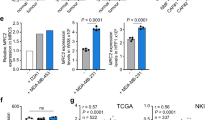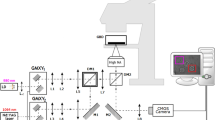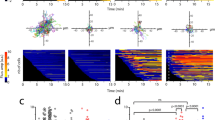Abstract
Cell adhesiveness is fundamental to a variety of biological phenomena, including tumour development and metastasis1–4. Recently, Bubenik et al.5 have reported that in various malignant fibroblastoid cell lines those cells which demonstrated less adhesiveness were more tumorigenic. The relationship between cell adhesiveness, transformation and metastasis has been studied extensively in cells (fibroblastoid) grown as monolayers attached to their substratum and to each other4,6–9, but, to our knowledge, there has been no report describing this relationship in suspension-borne (lymphoid) cells that grow free of each other and their substratum. We report here that substrate-adhering variant cells, selected from the tumorigenic, suspension-growing S49 mouse lymphoma, have impaired tumorigenicity. Furthermore, the substrate-adhering cells also have increased immunogenicity, as their inoculation into mice protects the mice from subsequent challenges with parental, non-adherent tumorigenic S49 cells. These findings suggest a new approach for the selection of immunogenic cells from suspension-borne tumorigenic cell populations.
This is a preview of subscription content, access via your institution
Access options
Subscribe to this journal
Receive 51 print issues and online access
$199.00 per year
only $3.90 per issue
Buy this article
- Purchase on Springer Link
- Instant access to full article PDF
Prices may be subject to local taxes which are calculated during checkout
Similar content being viewed by others

References
Ludford, R. J. Proc. R. Soc. B112, 250–263 (1932).
Cowdry, E. V. Archs Path. 30, 1245–1274 (1940).
Coman, D. R. Cancer Res. 4, 625–647 (1944).
Grinnel, F. Int. Rev. Cytol. 53, 65–143 (1978).
Bubenik, J. et al. Int. J. Cancer 23, 392–395 (1979).
Pouyssegur, J. M. & Pastan, I. Proc. natn. Acad. Sci. U.S.A. 73, 544–548 (1976).
Winkelhake, J. L. & Nicolson, G. L. J. natn. Cancer Inst. 56, 285–291 (1976).
Briles, E. B. & Kornfeld, S. J. natn. Cancer Inst. 60, 1217–1222 (1978).
Murray, J. C., Liotta, L., Rennard, S. I. & Martin, G. R. Cancer Res. 40, 347–351 (1980).
Horibata, K. & Harris, A. W. Expl Cell Res. 60, 61–77 (1970).
Coffino, P., Bourne, H. R. & Tomkins, G. M. J. cell. Physiol. 85, 603–610 (1975).
Hochman, J., Katz, A., Levy, E. & Eshel, S. (in preparation).
Coman, D. R. Cancer Res. 14, 519–531 (1954).
Lindenmann, J. J. Immun. 92, 912–919 (1964).
Lindenmann, J. Biochim. biophys. Acta 355, 49–75 (1974).
Bekesi, G., Arneault, S. & Holland, J. Proc. Am. Ass. Cancer Res. 12, 47 (1971).
Hashimoto, Y. & Yamanoha, B. Gann 67, 315–319 (1976).
Hashimoto, Y., Yamanoha, B., Endoh, H. & Ishizuka, T. in Gann Monograph on Cancer Research (ed. Kobayashi, H.) 23, 135–141 (Japan Scientific Societies, Tokoyo, 1979).
Harris, H., Miller, O. I., Klein, G., Worst, P. & Tachibana, T. Nature 223, 363–366 (1969).
Klein, G. & Harris, H. Nature new Biol. 237, 163–164 (1972).
Shinitzky, M., Skornick, Y. & Haran-Ghera, N. Proc. natn. Acad. Sci. U.S.A. 76, 5313–5316 (1979).
Gann Monograph on Cancer Research (ed. Kobayashi, H.) 23 (Japan Scientific Societies, Tokyo, 1979).
Author information
Authors and Affiliations
Rights and permissions
About this article
Cite this article
Hochman, J., Katz, A., Levy, E. et al. Substrate-adhering lymphoid cells show impaired tumorigenicity and increased immunogenicity. Nature 290, 248–249 (1981). https://doi.org/10.1038/290248a0
Received:
Accepted:
Issue Date:
DOI: https://doi.org/10.1038/290248a0
This article is cited by
-
Isolation and characterization of a low metastatic variant from EL-4 mouse T-lymphoma
Clinical & Experimental Metastasis (1992)
-
Generation of adhesive tumor variants: Chromosomal changes, reduction in malignancy and increased expression of a distinct membrane glycoprotein
Clinical & Experimental Metastasis (1988)
-
Cell-contact and-architecture of malignant cells and their relationship to metastasis
CANCER AND METASTASIS REVIEW (1987)
-
Fourier analysis of the shape of normal and transformed epithelial cells derived from human transitional epithelium
Histochemistry (1984)
Comments
By submitting a comment you agree to abide by our Terms and Community Guidelines. If you find something abusive or that does not comply with our terms or guidelines please flag it as inappropriate.


